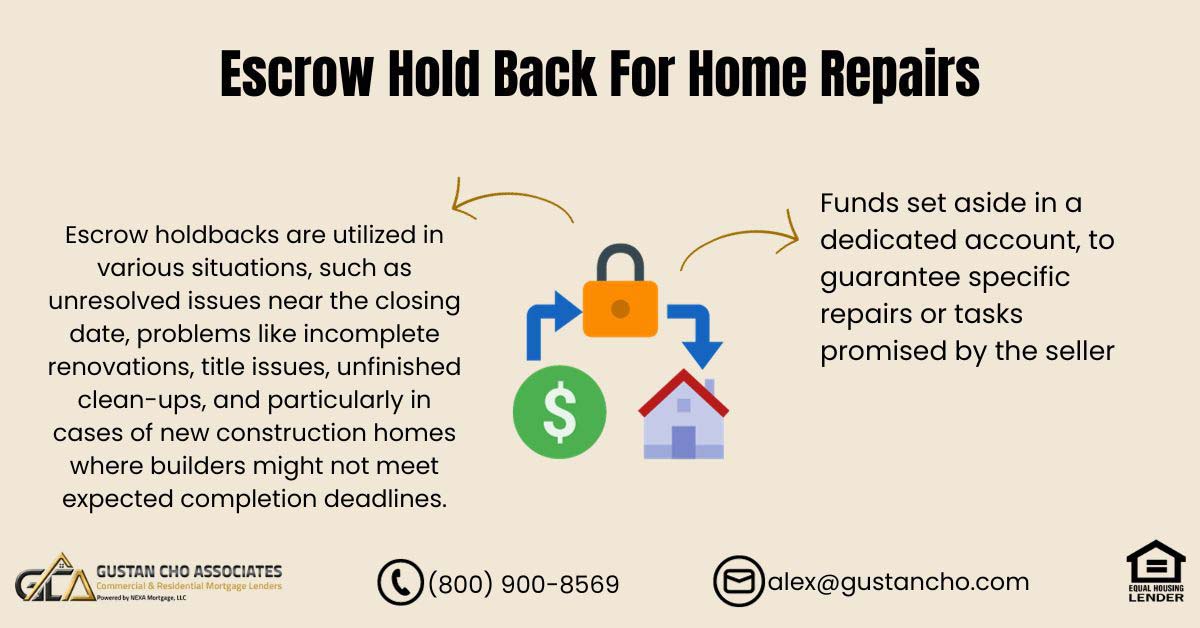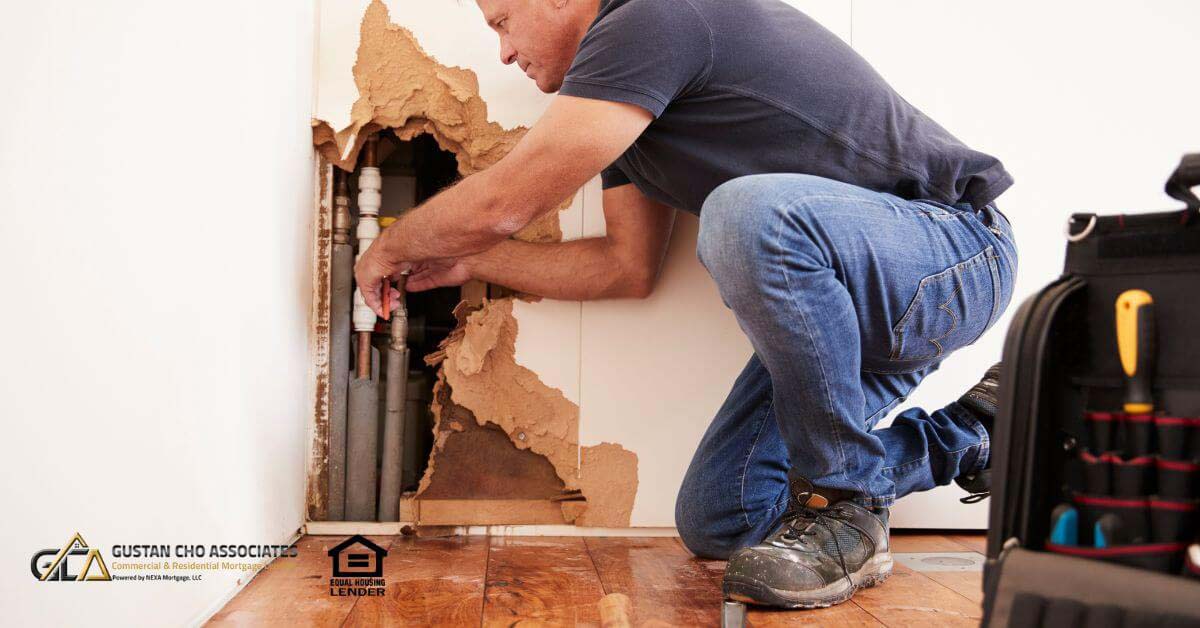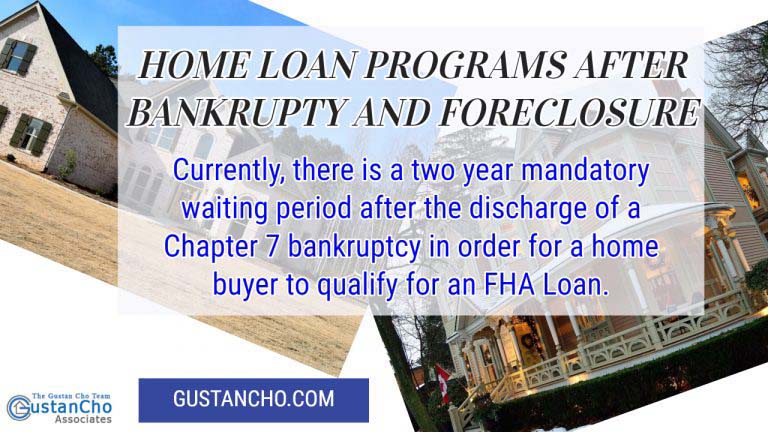This article will cover what escrow hold back is in the mortgage loan process. We will discuss escrow hold back mortgage guidelines for repairs. Nothing is worse than approaching your closing date and having issues arise. Dale Elenteny, a senior loan officer at Gustan Cho Associates, explains escrow hold backs for home repairs as follows:
Frequently, these matters can be resolved, but occasionally they remain unresolved. Problems arising towards the end of the process can create significant stress for both sellers and buyers. In cases where a closing date is missed, adjustments to living arrangements might be necessary, incurring substantial costs. Employing an escrow holdback can often salvage a deal in various situations.
This topic can be perplexing within the mortgage sector. Given that numerous lenders have restrictions on escrow holdbacks, it’s crucial to grasp the scenarios where this method can or cannot be applied. This blog will highlight instances where Gustan Cho Associates have employed escrow holdbacks. Subsequently, we’ll delve into the definition of escrow holdbacks in the homebuyer and seller mortgage process.
What Is An Escrow Hold Back and How Does It Work
In mortgages, “escrow” can refer to two things:
- Handling taxes and insurance payments, and
- holding back funds for incomplete work. Here, we focus on the second aspect.
Escrow hold backs involve setting aside money in a dedicated account to cover specific work the seller needs to complete later. These funds guarantee that the necessary repairs or improvements will be made. A third party, usually the title company, holds this money, and it can only be released once the work is completed and approved by the lender with assistance from an officer of the title company. This process ensures protection for both the buyer and the lender.
Case Scenarios of Escrow Hold Back By Lenders Is Necessary
Examples of escrow hold backs are newly installed systems (septic systems). Renovations that still need to be completed. Title Issues. Clean-ups are not yet complete. Throwing out the compost. NEW CONSTRUCTION HOLD BACKS.
Need an Escrow Holdback for Home Repairs? We Can Help!
Contact us today to learn how an escrow holdback can help you complete your home repairs.
Escrow Hold Back For Large Ticket Items Like Septic Systems
A key part of real estate transactions is checking the septic system. Before closing, someone needs to inspect and approve the septic system. If it fails, it can delay closing.
To manage this, sellers can set aside money for repairs in an escrow account while still closing the deal. This assures the lender that the repairs will be done before the buyer moves in.
Typically, lenders require several repair quotes and keep 150% of the highest quote in the escrow account. This helps cover unexpected costs. If there’s any money left after the repairs, it goes back to the seller. An inspector or an appraiser usually conducts the inspection. Once closing is complete, both parties can feel satisfied with the result.
Escrow Hold Back Are Common on New Construction Homes
When buying a new construction home, it’s important to understand that builders usually provide estimated timeframes for project completion. However, weather conditions and labor issues can often influence these timelines, which may cause construction delays. As a result, you might encounter escrow hold back, where the final payment is withheld until all work is satisfactorily completed.
This is important for first-time buyers to remember as it can lead to unexpected delays in moving into your new home. Having a backup plan can help you handle these situations better. For example, this winter, we saw cases where homes weren’t ready because yard work couldn’t be done due to the weather.
Landscaping Escrow Hold Back
Landscaping stands out as a frequent application for a holdback. We allocate 150% of the landscaping expenses into an escrow account, set to be finalized when spring arrives and the temperature rises. Driveways also often fall under holdbacks; however, their completion is sometimes weather-dependent and may need to wait until the ground thaws.
Escrow Hold Back on Home Repairs Guidelines on Loan Programs
Each loan program has specific rules about escrow holdbacks. For new construction properties, the cost of improvements cannot exceed 2% of the home’s appraised value. This limit is in place because going over it increases risk, requiring the work to be finished before closing.
For example, if the home is valued at $300,000, the maximum escrow holdback is $6,000. The timeframe for completing the work varies by loan type: Conventional and FHA loans allow 180 days from the closing date, while VA loans require the work to be done in 90 to 120 days.
Are There Caps on Escrow Hold Backs For Home Repairs
Below are the caps on escrow hold backs:
| Loan Type | Max Escrow Holdback |
|---|---|
| FHA | $5,000 |
| VA | No official cap |
| USDA | 10% of loan amount |
| Fannie Mae | 10% of appraised value |
| Freddie Mac | 15% of appraised value |
Gustan Cho Associates offers flexible mortgage solutions without any lender overlays. This means we can use escrow holdbacks to help keep your deal on track, following the specific guidelines for each loan program. We work with all types of mortgages, including Conventional, FHA, VA, and USDA loans. Our team is available seven days a week to answer your mortgage questions.
Call or text Alex Carlucci at 800-900-8569 or email him at alex@gustancho.com for a quick response. We are a leading national mortgage company that offers government and conventional loans without extra requirements. We can help you with escrow holdbacks for necessary repairs. Our licensed team is available every day, including evenings, weekends, and holidays.
Escrow Hold Backs For House Repairs
Taking care of your home is important. It’s not just a cozy spot to unwind; it’s a pretty big investment that needs regular maintenance and some repairs now and then to keep it in good shape and avoid bigger issues down the road. Whether you own or rent, you’ll likely face common issues like leaky faucets, clogged drains, cracked tiles, peeling paint, or squeaky doors. Some of these repairs are simple, while others may need a professional.
This section explains why household repairs matter and what they involve. It compares doing the repairs yourself to hiring someone. We’ll also provide tips and resources to help you easily handle your home repair projects.
Escrow Hold Back For Home Repairs For Major House Repairs
These extensive repairs demand increased time, finances, and expertise. Additionally, they might necessitate permits, licenses, or inspections. Typically, they should be handled by a skilled contractor or handyman. Major repairs include replacing a water heater, rewiring a circuit breaker, installing a new roof, adding an extension, or renovating a kitchen or bathroom.
Why Are House Repairs Important?
House repairs are important for several reasons. They improve the comfort and safety of your home. Fixing any problems affecting the functionality or appearance of your home will make living in the house more comfortable and enjoyable. You can also prevent any hazards that could harm you or your family, such as electrical shocks, water damage, mold growth, fire risks, or structural failures.
They increase the value and curb appeal of your home. By fixing any problems affecting your home’s quality attractiveness, you can make it more appealing and desirable to potential buyers or renters. You can also increase its market value and get a higher return on your investment if you decide to sell or rent it out.
They offer long-term savings in both money and time. Addressing any issues that might deteriorate over time or lead to more significant damage to your home helps steer clear of expensive and complex repairs down the road.
Additionally, it helps prolong the life and efficiency of your home’s systems and appliances while cutting down on energy expenses and lessening your environmental footprint. Being proactive and watchful when it comes to home repairs is crucial. Detecting potential problems early on not only saves you from costly repairs but also prevents further harm.
Need to Finance Home Repairs After Closing?
Contact us today to find out how we can help you get the funding you need for home repairs through an escrow holdback.
Escrow Hold Back For Water Damage
Water damage stands out as a prevalent concern among homeowners. Keep an eye out for indicators such as water stains on walls or ceilings, paint that’s peeling, floors that seem warped, or any musty smells. These signs could point to plumbing leaks, troubles with the roof, or insufficient drainage. Taking immediate action against water damage helps stop the growth of mold, prevents structural problems, and avoids further deterioration.
Escrow Hold Back For Cracks and Settling
Monitor your home for cracks in the walls, floors, or foundation. Small cracks are usually harmless, but larger or expanding cracks
can indicate foundation settling or structural issues. Consult a professional if you notice significant cracks to determine the cause and recommend appropriate repairs.
Escrow Hold Back For Electrical Problems
Electrical problems can present significant safety risks. Watch for signs such as flickering lights, circuit breakers that trip frequently, warm-to-touch outlets, or buzzing sounds. These indicators might suggest overloaded circuits, faulty wiring, or outdated electrical systems. It’s crucial to enlist a licensed electrician to evaluate and fix any electrical issues to safeguard your home’s safety.
Pest Infestations
Pests like termites, ants, rodents, or insects can wreak havoc on your home. Look for signs of infestation, such as droppings, chewed wires or furniture, or holes in woodwork. Timely action is essential to prevent extensive damage. Hire a professional pest control service to address infestations and implement preventive measures.
Escrow Hold Back For Roofing Issues
Your roof is your home’s first defence against the elements. Inspect your roof regularly for sagging areas, missing or damaged shingles, or signs of leaks, such as water stains in the attic. Roofing problems can lead to water damage, mold growth, or compromised structural integrity. Contact a reputable roofing contractor for inspection and repairs if you notice any issues.
Escrow Hold Back For HVAC System Performance
Keep a close eye on how well your heating and cooling systems are working. Unusual sounds, not enough cooling or heating, or higher energy bills might signal issues with your HVAC system. It’s crucial to regularly schedule maintenance appointments and inspections to maintain peak efficiency and avoid any potential breakdowns in your HVAC system.
Escrow Hold Back For Aging Infrastructure
If your residence is an older construction, understanding aging infrastructure is crucial. This encompasses obsolete plumbing, electrical systems, or appliances. Stay alert for indicators like corroded pipes, frequent electrical problems, or inefficient appliances. Modernizing these systems can enhance safety, energy efficiency, and the general functionality of your home.
Escrow Hold Back For Clogged Gutters and Drainage
Blocked gutters may result in overflowing water, causing potential water damage and foundation issues. It’s crucial to consistently remove debris from gutters and downspouts to maintain adequate water flow away from your house. Furthermore, inspect the grading around your property regularly to guarantee effective drainage and prevent water buildup near the foundation.
Research and Educate Yourself
Prior to commencing the repair work, invest time in researching and familiarizing yourself with the precise repair procedure. Utilize tutorial videos, comprehensive guides, and trusted online sources or manuals pertaining to the repair at hand. A thorough grasp of the process will facilitate the successful and safe completion of the repair.
Follow Safety Precautions
Safety should always be a priority when doing house repairs. Ensure you turn off the power supply or shut off the water source before
working on electrical or plumbing repairs. Use proper safety equipment, follow instructions carefully, and exercise caution throughout the repair process.
Start Small and Gain Experience
If you’re new to DIY repairs, starting with smaller and simpler tasks is best to build your skills and confidence. Tackling minor repairs like replacing a doorknob, fixing a leaky faucet, or replacing a light switch can be great starting points. As you gain experience and proficiency, you can gradually take on more complex repairs.
Know Your Limitations
While it’s empowering to do your repairs, it’s essential to recognize your limitations. Some repairs may require specialized skills, knowledge, or equipment that you may not possess. In such cases, hiring a professional is wise to ensure the job is done correctly and avoid causing further damage or safety risks.
Maintain a Well-Stocked Toolkit
As you embark on your DIY repair journey, having a well-stocked toolkit that includes essential tools and supplies is crucial. This will allow you to tackle many repairs without running to the store each time. Keep your tools organized and in good condition, and replenish any depleted supplies promptly.
Conclusion
Engaging in home repairs not only helps you save money but also gives you a feeling of achievement. By conducting thorough research, adhering to safety measures, and beginning with simpler tasks, you can steadily enhance your expertise and self-assurance.
Yet, it’s crucial to acknowledge when a repair job surpasses your capabilities and to reach out for expert assistance. Keeping a well-equipped toolkit handy and staying proactive with routine upkeep will significantly contribute to your home’s durability and efficiency. While DIY repairs can be fulfilling, prioritizing your home’s safety and structural integrity should remain paramount.
If you have any questions about Escrow Hold Back For Home Repairs, please get in touch with Gustan Cho Associates at 800-900-8569. Text us for a faster response. Or email us at gcho@gustancho.com. The team at Gustan Cho Associates is available 7 days a week, on evenings, weekends, and holidays.
FAQ about Escrow Hold Back For Home Repairs
Q: What is Escrow Hold Back in the Mortgage Loan Process?
A: Escrow Hold Back is a mechanism in the mortgage loan process where funds are allocated into a dedicated account for specific items that the seller will address later. These funds guarantee that necessary work is completed, serving as an insurance policy for both the buyer and the lender.
Q: How Does Escrow Hold Back Work?
A: A third party, often the title company, holds the allocated funds, and their release is contingent upon the completion of the work and approval by the lender. This process is facilitated by an officer from the title company.
Q: When is Escrow Hold Back Necessary?
A: Escrow hold back may be necessary for various scenarios such as newly installed systems (e.g., septic systems), renovations yet to be completed, title issues, and unfinished clean-ups, and especially common in new construction homes.
Q: What are Some Case Scenarios Where Lenders Use Escrow Hold Back?
A: Examples include issues with septic systems and landscaping, newly constructed homes with delays, and repairs requiring completion before closing.
Q: Are There Guidelines for Escrow Hold Back on Home Repairs Based on Loan Programs?
A: Yes, different loan programs have specific rules. For instance, Conventional and FHA loans require completion within 180 days from the closing date, while VA loans have a shorter timeframe of 90-120 days.
Q: Are There Caps on Escrow Hold Back Amounts for Home Repairs?
A: Yes, caps are depending on the loan program. For example, Fannie Mae caps at 10% of the appraised value, Freddie Mac at 15%, FHA at $5,000, VA does not specify a max total amount, and USDA caps at 10% of the final loan amount.
Q: How Can Escrow Hold Back be Used for New Construction Homes?
A: Escrow hold back is commonly used for new construction homes where delays may occur. It provides flexibility for landscaping or incomplete construction, ensuring a smooth closing process.
Q: What are Some Common Scenarios Where Escrow Hold Back is Applied for Repairs?
A: Escrow hold back is commonly used for issues like water damage, cracks and settling, electrical problems, pest infestations, roofing issues, HVAC system performance, aging infrastructure, and clogged gutters.
Q: Can Homeowners do Repairs Themselves?
A: Yes, homeowners can do repairs themselves by following safety precautions, starting with smaller tasks, gaining experience, and knowing their limitations. It’s crucial to research, use proper safety equipment, and maintain a well-stocked toolkit.
This blog about Escrow Hold Back For Home Repairs was updated on July 1st, 2025.
Ready to Move In But Need Repairs Done? An Escrow Holdback Can Help
Contact us today to find out how an escrow holdback works for home repairs.











How long will agent keep hold back waiting for an IRS lien to satisfy?
My closing agent sent funds to satisfy an IRS lien. The funds were applied to a different year that did not have a lien and the IRS will not correct the payment. The closing agent assumes no responsibility for how the funds were applied once the IRS received the funds.
As i navigate the problem and Corona came it is going on 18 months. Is there a limit to how long the agents keeps the hold back?
My home was hail damaged during the selling process. I have a closing date with the buyer still wanting the house even thought it will need a new roof, siding, gutters and two windows. The insurance company is on board with the damage and I have a contractor in line to do the repairs as parts are available due to supply chain problems. Can we still close in 10 days and will I receive my money from the sale or will the title company hold all money until repairs are made. What happens if the repairs are more than the money in escrow. Who has to add money to it? Thanks